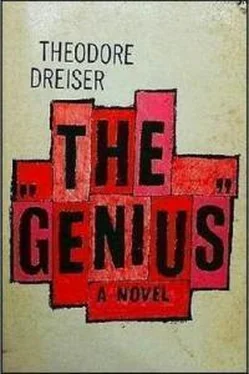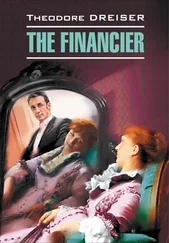Теодор Драйзер - The Genius
Здесь есть возможность читать онлайн «Теодор Драйзер - The Genius» весь текст электронной книги совершенно бесплатно (целиком полную версию без сокращений). В некоторых случаях можно слушать аудио, скачать через торрент в формате fb2 и присутствует краткое содержание. Год выпуска: 2014, Издательство: epubBooks Classics, Жанр: Классическая проза, на английском языке. Описание произведения, (предисловие) а так же отзывы посетителей доступны на портале библиотеки ЛибКат.
- Название:The Genius
- Автор:
- Издательство:epubBooks Classics
- Жанр:
- Год:2014
- ISBN:нет данных
- Рейтинг книги:4 / 5. Голосов: 1
-
Избранное:Добавить в избранное
- Отзывы:
-
Ваша оценка:
- 80
- 1
- 2
- 3
- 4
- 5
The Genius: краткое содержание, описание и аннотация
Предлагаем к чтению аннотацию, описание, краткое содержание или предисловие (зависит от того, что написал сам автор книги «The Genius»). Если вы не нашли необходимую информацию о книге — напишите в комментариях, мы постараемся отыскать её.
The Genius — читать онлайн бесплатно полную книгу (весь текст) целиком
Ниже представлен текст книги, разбитый по страницам. Система сохранения места последней прочитанной страницы, позволяет с удобством читать онлайн бесплатно книгу «The Genius», без необходимости каждый раз заново искать на чём Вы остановились. Поставьте закладку, и сможете в любой момент перейти на страницу, на которой закончили чтение.
Интервал:
Закладка:
It should be said here that at one time Suzanne truly imagined she loved Eugene. It must be remembered, however, that she was moved to affection for him by the wonder of a personality that was hypnotic to her. There was something about the personality of Eugene that was subversive of conventionality. He approached, apparently a lamb of conventional feelings and appearances; whereas, inwardly, he was a ravening wolf of indifference to convention. All the organized modes and methods of life were a joke to him. He saw through to something that was not material life at all, but spiritual, or say immaterial, of which all material things were a shadow. What did the great forces of life care whether this system which was maintained here with so much show and fuss was really maintained at all or not? How could they care? He once stood in a morgue and saw human bodies apparently dissolving into a kind of chemical mush and he had said to himself then how ridiculous it was to assume that life meant anything much to the forces which were doing these things. Great chemical and physical forces were at work, which permitted, accidentally, perhaps, some little shadow–play, which would soon pass. But, oh, its presence—how sweet it was!
Naturally Suzanne was cast down for the time being, for she was capable of suffering just as Eugene was. But having given her word to wait, she decided to stick to that, although she had not stuck to her other. She was between nineteen and twenty now—Eugene was nearing forty. Life could still soothe her in spite of herself. In Eugene's case it could only hurt the more. Mrs. Dale went abroad with Suzanne and the other children, visiting with people who could not possibly have heard, or ever would except in a vague, uncertain way for that matter. If it became evident, as she thought it might, that there was to be a scandal, Mrs. Dale proposed to say that Eugene had attempted to establish an insidious hold on her child in defiance of reason and honor, and that she had promptly broken it up, shielding Suzanne, almost without the latter's knowledge. It was plausible enough.
What was he to do now? how live? was his constant thought. Go into a wee, small apartment in some back street with Angela, where he and she, if he decided to stay with her, could find a pretty outlook for a little money and live? Never. Admit that he had lost Suzanne for a year at least, if not permanently, in this suddenly brusque way? Impossible. Go and confess that he had made a mistake, which he still did not feel to be true? or that he was sorry and would like to patch things up as before? Never. He was not sorry. He did not propose to live with Angela in the old way any more. He was sick of her, or rather of that atmosphere of repression and convention in which he had spent so many years. He was sick of the idea of having a child thrust on him against his will. He would not do it. She had no business to put herself in this position. He would die first. His insurance was paid up to date. He had carried during the last five years a policy for something over eighteen thousand in her favor, and if he died she would get that. He wished he might. It would be some atonement for the hard knocks which fate had recently given her, but he did not wish to live with her any more. Never, never, child or no child. Go back to the apartment after this night—how could he? If he did, he must pretend that nothing had happened—at least, nothing untoward between him and Suzanne. She might come back. Might! Might! Ah, the mockery of it—to leave him in this way when she really could have come to him—should have—oh, the bitterness of this thrust of fate!
There was a day when the furniture was sent away and Angela went to live with Myrtle for the time being. There was another tearful hour when she left New York to visit her sister Marietta at Racine, where they now were, intending to tell her before she came away, as a profound secret, the terrible tragedy which had overtaken her. Eugene went to the train with her, but with no desire to be there. Angela's one thought, in all this, was that somehow time would effect a reconciliation. If she could just wait long enough; if she could keep her peace and live and not die, and not give him a divorce, he might eventually recover his sanity and come to think of her as at least worth living with. The child might do it, its coming would be something that would affect him surely. He was bound to see her through it. She told herself she was willing and delighted to go through this ordeal, if only it brought him back to her. This child—what a reception it was to receive, unwanted, dishonored before its arrival, ignored; if by any chance she should die, what would he do about it? Surely he would not desert it. Already in her nervous, melancholy way, she was yearning toward it.
"Tell me," she said to Eugene one day, when they were alternately quarreling and planning, "if the baby comes, and I—and I—die, you won't absolutely desert it? You'll take it, won't you?"
"I'll take it," he replied. "Don't worry. I'm not an absolute dog. I didn't want it. It's a trick on your part, but I'll take it. I don't want you to die. You know that."
Angela thought if she lived that she would be willing to go through a period of poverty and depression with him again, if only she could live to see him sane and moral and even semi–successful. The baby might do it. He had never had a child. And much as he disliked the idea now, still, when it was here, he might change his mind. If only she could get through that ordeal. She was so old—her muscles so set. Meanwhile she consulted a lawyer, a doctor, a fortune teller, an astrologer and the Christian Science practitioner to whom Myrtle had recommended her. It was an aimless, ridiculous combination, but she was badly torn up, and any port seemed worth while in this storm.
The doctor told her that her muscles were rather set, but with the regimen he prescribed, he was satisfied she would be all right. The astrologer told her that she and Eugene were fated for this storm by the stars—Eugene, particularly, and that he might recover, in which case, he would be successful again in a measure. As for herself, he shook his head. Yes, she would be all right. He was lying. The fortune teller laid the cards to see if Eugene would ever marry Suzanne, and Angela was momentarily gratified to learn that she would never enter his life—this from a semi–cadaverous, but richly dressed and bejeweled lady whose ante–room was filled with women whose troubles were of the heart, the loss of money, the enmity of rivals, or the dangers of childbirth. The Christian Science practitioner declared all to be divine mind—omnipotent, omnipresent, omniscient good, and that evil could not exist in it—only the illusion of it. "It is real enough to those who give it their faith and believe," said the counselor, "but without substance or meaning to those who know themselves to be a perfect, indestructible reflection of an idea in God. God is a principle. When the nature of that principle is realized and yourself as a part of it, evil falls away as the troublesome dream that it is. It has no reality." She assured her that no evil could befall her in the true understanding of Science. God is love.
The lawyer told her, after listening to a heated story of Eugene's misconduct, that under the laws of the State of New York, in which these misdeeds were committed, she was not entitled to anything more than a very small fraction of her husband's estate, if he had any. Two years was the shortest time in which a divorce could be secured. He would advise her to sue if she could establish a suitable condition of affluence on Eugene's part, not otherwise. Then he charged her twenty–five dollars for this advice.
Chapter XXIV
To those who have followed a routine or system of living in this world—who have, by slow degrees and persistent effort, built up a series of habits, tastes, refinements, emotions and methods of conduct, and have, in addition, achieved a certain distinction and position, so that they have said to one "Go!" and he goes, and to another "Come!" and he comes, who have enjoyed without stint or reserve, let or hindrance, those joys of perfect freedom of action, and that ease and deliberation which comes with the presence of comparative wealth, social position, and comforts, the narrowing that comes with the lack of means, the fear of public opinion, or the shame of public disclosure, is one of the most pathetic, discouraging and terrifying things that can be imagined. These are the hours that try men's souls. The man who sits in a seat of the mighty and observes a world that is ruled by a superior power, a superior force of which he by some miraculous generosity of fate has been chosen apparently as a glittering instrument, has no conception of the feelings of the man who, cast out of his dignities and emoluments, sits in the dark places of the world among the ashes of his splendor and meditates upon the glory of his bygone days. There is a pathos here which passes the conception of the average man. The prophets of the Old Testament discerned it clearly enough, for they were forever pronouncing the fate of those whose follies were in opposition to the course of righteousness and who were made examples of by a beneficent and yet awful power. "Thus saith the Lord: Because thou hast lifted thyself up against the God of Heaven, and they have brought the vessels of His house before thee, and thou and thy Lords, thy wives and concubines, have drank wine in them, and thou hast praised the gods of silver and gold, of brass, iron, wood, and stone … God hath numbered thy Kingdom and finished it. Thou art weighed in the balance and found wanting; thy Kingdom is divided and given to the Medes and the Persians."
Читать дальшеИнтервал:
Закладка:
Похожие книги на «The Genius»
Представляем Вашему вниманию похожие книги на «The Genius» списком для выбора. Мы отобрали схожую по названию и смыслу литературу в надежде предоставить читателям больше вариантов отыскать новые, интересные, ещё непрочитанные произведения.
Обсуждение, отзывы о книге «The Genius» и просто собственные мнения читателей. Оставьте ваши комментарии, напишите, что Вы думаете о произведении, его смысле или главных героях. Укажите что конкретно понравилось, а что нет, и почему Вы так считаете.









